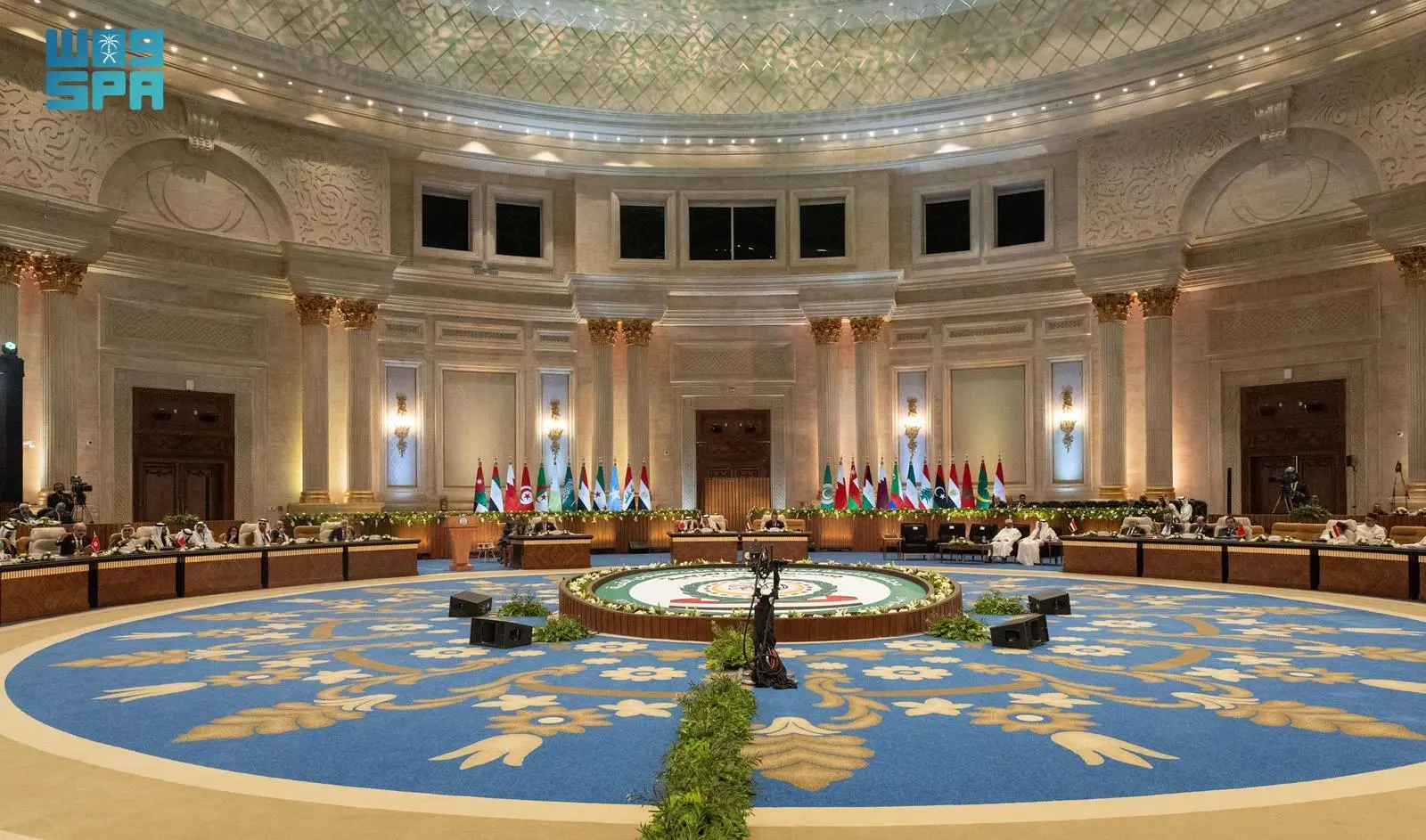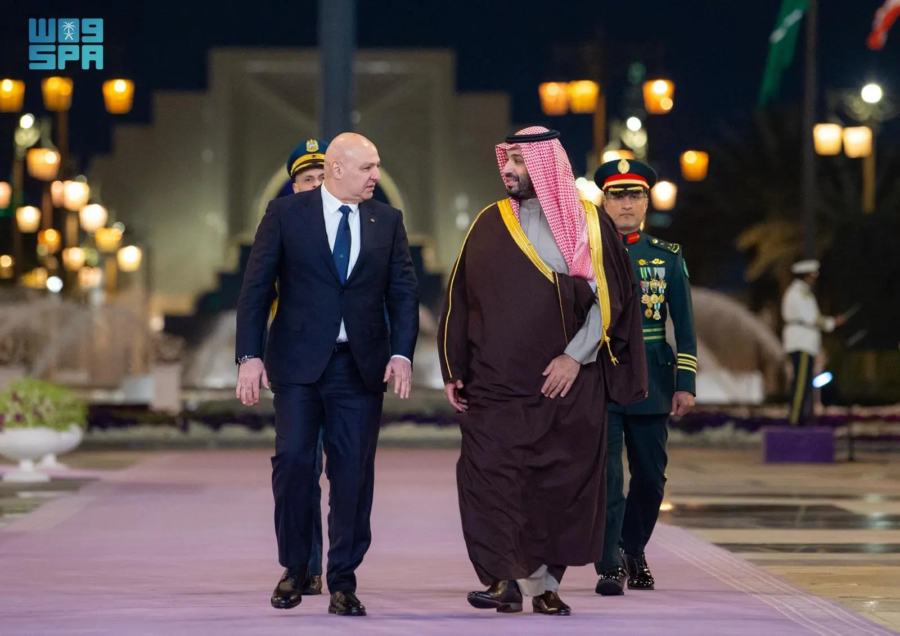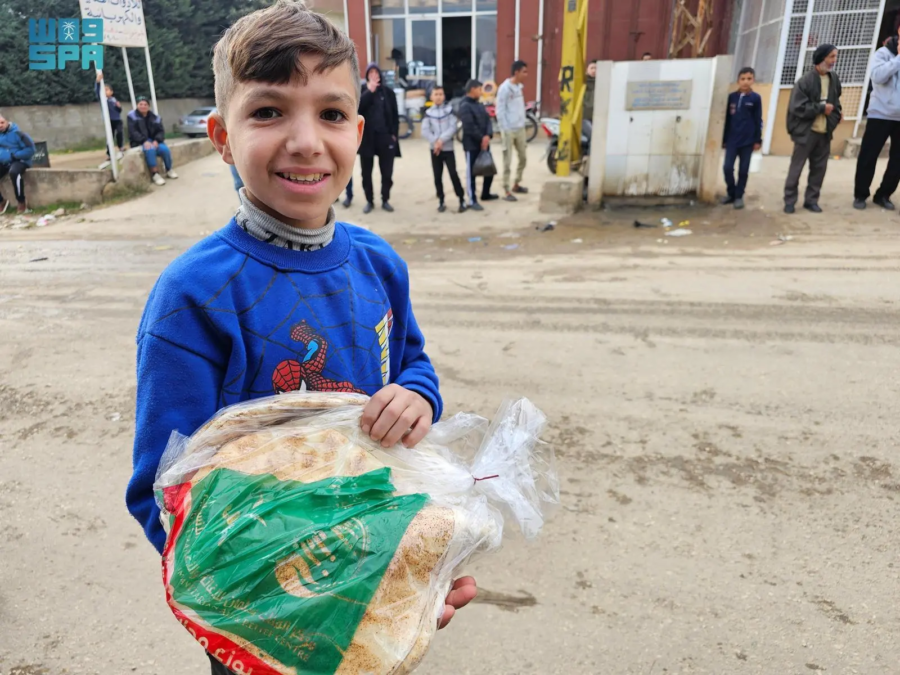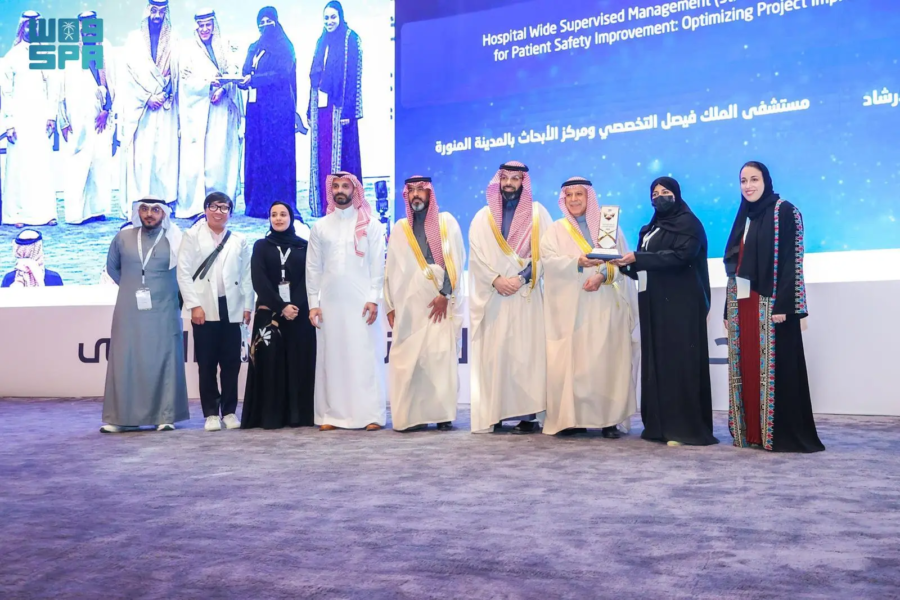
|
|||
QUOTED
|
|||
TOP STORYEgypt’s Gaza plan endorsed at Extraordinary Arab Summit in Cairo
Arab leaders endorsed Egypt’s $53 billion postwar plan for the Gaza Strip that would allow its roughly 2 million Palestinians to remain. A counterproposal to Donald Trump’s plan to depopulate the territory and redevelop it as a beach destination. [more] |
|||
TOP STORYNewly elected president of Lebanon makes Riyadh his first foreign visit
Lebanese President Joseph Aoun arrived in Riyadh on Monday afternoon on his first official foreign visit nearly two months after being elected as president of the country. [more] |
|||
TOP STORYJadwa Investment’s 2025 Saudi Economy report sees continued broad-based growth
Fresh off being named 2024 Asset Manager of the Year at the recent Saudi Capital Market Awards, Jadwa Investment has released its Saudi Economy in 2025 macroeconomic report. [more] |
|||
TOP STORYSaudi Arabia’s 5th nationwide charitable giving campaign begins
Overseen by the Saudi Data and Artificial Intelligence Authority (SDAIA) and established in 2021, the National Platform for Charitable Work (Ehsan) launched its 5th National Campaign for Charitable Work today. The platform has raised over $1.33 billion since 2021. [more] |
|||
TOP STORYKing Faisal Specialist Hospital Rises 20 Spots in Newsweek’s Global Top 250 Hospitals Ranking
According to Newsweek’s 2025 ranking of the world’s best hospitals, King Faisal Specialist Hospital & Research Centre (KFSHRC) was named the top hospital in Saudi Arabia for the fourth consecutive year while also making the list of the top 250 hospitals worldwide. [more] |
|||
Zelensky says US and Ukraine will hold talks next week in Saudi Arabia on ending the warin lemonde.fr: Ukrainian President Volodymyr Zelensky says talks between Ukraine and the US on ending the war will take place in Saudi Arabia next week. In his nightly address on Thursday, March 6, Zelensky said he would travel to Saudi Arabia on Monday and his team would stay on to hold talks with US officials. I am scheduled to visit Saudi Arabia to meet with the Crown Prince. After that, my team will stay in Saudi Arabia to work with American partners. Ukraine is most interested in peace, Zelensky said. The EUs 27 leaders on Thursday greenlit a plan drawn up by the European Commission that aims to mobilize €800 billion to rearm Europe against the perceived threat from Russia. At the summit, Zelensky told EU leaders that Ukrainian and American negotiators had resumed work, and that we hope that next week we will have a meaningful meeting. He thanked EU leaders for standing by Kyiv, with Americas outreach to Russia raising fears Ukraine could be forced into an unfavorable deal. We are very thankful that we are not alone, said the Ukrainian leader. |
|||
Analysis: PwC’s Saudi ban is a warning signVia Wael Mahdi in semafor.com: The Gulf is one of the few remaining growth markets for global consultancy firms, and Saudi Arabia has been a particularly lucrative destination. The kingdom’s Vision 2030 transformation has relied heavily on firms like McKinsey & Co., Boston Consulting Group, PwC, and others to design and execute economic and regulatory overhauls. Entry-level compensation is higher than London “even without adjusting for taxes,” according to The Financial Times, and the region has become a bright spot in a declining industry. PwC’s temporary ban — reportedly affecting its advisory business but without clarification on the specific type of work impacted — has not been confirmed or explained by either the firm or the sovereign wealth fund. The lack of transparency has added to the mystery surrounding the situation. The suspension has reignited debates about the dominance of foreign consultancies, with many Saudis expressing frustration over what they see as a monopoly by these firms, arguing that such dominance stifles the development of local expertise and opportunities. This sentiment underscores a broader call for economic sovereignty and the cultivation of homegrown talent. |
|||
Is Saudi Arabia the next China or India? See for yourselfVia Angela Chitkara, Curtis S. Chin in yahoo.com: For decades, Saudi Arabia has been viewed through an increasingly outdated lens—an oil-rich kingdom dependent on energy exports and held back by regional politics and what some describe as a fundamentalist Islamist past. That perception is so 20th century. Saudi Arabia is not the next China or the next India. With a population of just more than 33 million, this kingdom on the move is evolving into something entirely its own. Ranked as the world’s 19th-largest economy and the seventh largest in Asia, according to International Monetary Fund (IMF) data, with a GDP of approximately $1.14 trillion, Saudi Arabia is leveraging its oil wealth to transition beyond dependence on fossil fuels. |
|||
Diriyah Art Futures Reflects Growing Saudi Investment in Digital ArtVia Rebecca Anne Proctor in agsiw.org: Located prominently on King Faisal Road in Al Bujairi, Diriyah, just northwest of Riyadh, is the vast new 129,000 square foot Diriyah Art Futures institute. Inaugurated in December 2024, the new media arts center is dedicated to the rapidly expanding genre of digital art and is among the first institute of its kind in the Middle East and North Africa. Developed by Saudi Arabia’s Ministry of Culture, Diriyah Art Futures highlights the kingdom’s growing interest and investment in art and culture involving new technology and artificial intelligence. Haytham Nawar, director of Diriyah Art Futures and former chair of the arts department at the American University in Cairo, said the exhibition is significant because “it provides a historical overview” of digital art. “In Saudi, there is knowledge of the history of computational art, especially the usage of AI and generative art,” added Nawar. “What it does is connect international artists in the field with those working in Saudi.” |
|||
TKO Launches Boxing Promotion Partnership With Saudi Arabia’s Turki Alalshikh, Sela GroupVia Jill Goldsmith in deadline.com: UFC and WWE parent TKO Group has, as promised, jumped into boxing, inking a partnership with Saudi Arabia. The deal with His Excellency Turki Alalshikh, chairman of the Saudi General Entertainment Authority, and Sela, the Saudi national entertainment and events conglomerate, will establish a new boxing promotion that will provide a platform for leading boxers and prospects in the sport. TKO will serve as managing partner, providing day-to-day operational expertise, management and oversight of the promotion, with executive leadership anchored by UFC CEO Dana White and WWE president and TKO board member Nick Khan. TKO CEO Mark Shapiro called the agreement “a strategic opportunity to reimagine the sport of boxing globally.” He had teased a deal as imminent on an earnings call last week. “TKO has the deep expertise, promotional prowess, and longstanding relationships. HE Turki Alalshikh and Sela share our passion and vision for evolving the current model. Together, we can bring the sweet science back to its rightful place in the forefront of the global sports ecosystem.” |
|||
Israel’s Shin Bet says Netanyahu policies helped pave way for 7 OctoberVia Julian Borger in theguardian.com: Israel’s internal security agency, Shin Bet, has said Benjamin Netanyahu’s policies were among the underlying causes of the 7 October 2023 attack in which Hamas and other militants killed about 1,200 Israelis. In its report on the 7 October attack, Shin Bet acknowledged its own responsibility, admitting it was aware of warning signs that Hamas was planning an operation, but the agency, also known as the General Security Service (GSS), did not grasp the scale, timing and location of the planned attack. Among the main reasons for a Hamas military build-up before the attacks, an eight-page public summary of the report listed an Israeli “policy of quiet” towards the group, apparently referring to a policy of restraint in the use of force to keep Hamas’s military capability in check. It also listed Netanyahu’s acquiescence in the flow of funds from Qatar to Gaza, a policy designed to divide Palestinians by boosting Hamas at the expense of the Palestinian state. |
|||
Saudi jobs market buoyant as Egypt and Kuwait struggleVia Gavin Gibbon in agbi.com: Staffing levels in Saudi Arabia surged in February as companies prepare for growth opportunities ahead. But it was a different story in neighbouring Kuwait and Egypt where jobs were lost in the face of a slowdown in new orders, according to the latest business sentiment surveys. Employment numbers in Saudi Arabia increased at the quickest rate in 16 months in February. The manufacturing and services sector in particular experienced significant growth, according to the seasonally adjusted Riyad Bank Saudi Arabia Purchasing Managers’ Index (PMI), a monthly indicator of conditions in the non-oil economy. The index fell from a decade-high of 60.5 in January to 58.4 last month, but remains well above the 50.0 mark that separates economic growth from contraction. |
|||
Saudi oil giant Aramco posts drop in full-year profit, slashes dividendVia Natasha Turak in cnbc.com: Saudi state oil producer Aramco reported on Tuesday a decline in net profit to $106.2 billion in 2024, down from $121.3 billion in 2023. The company said it expects total dividends for 2025 of $85.4 billion — a significant fall from 2024′s total of $124.2 billion. This comes as it cut its total payout for the fourth quarter. The oil giant said its base dividend for the final three months of the year would be increased to $21.1 billion, but its performance-linked payout would be just $200 million. This compares to a third-quarter base dividend of $20.3 billion and a performance-linked dividend of $10.8 billion. Lower oil prices hit the company’s net profit last year as crude production around the world increased and demand slowed. Amarco’s realized oil price — the final price the company receives for selling its crude after accounting for transport costs and other factors — dropped to $80.2 per barrel in 2024 from $83.6 the year prior. |
|||
Estimating the economic impacts of AI in Saudi ArabiaVia Andrea Barone, Anila Graupp and Samia Melhem in worldbank.org: Since 2019, the World Bank has been actively engaged with Saudi authorities to enhance the Kingdoms digital sector, and with AI adoption spreading at breakneck speed across the globe, this work continues. Our collaboration has aimed to transform the way people in Saudi Arabia experience everyday online transactions and engage with government services through partnership and technical assistance with four key digital authorities: 1) the Ministry of Communications and Information Technologies (MCIT), 2) the Saudi Digital Government Authority, 3) the Saudi Data and Artificial Intelligence Authority, and 4) the Digital Cooperation Organization. And tangible results were achieved. For example, Saudi Arabia successfully implemented key reforms that revolutionized the production and delivery of public services through digital means. These reforms have improved back-end operations related to data and information management, streamlined workflows and processes around people’s needs, and enhanced online user interfaces. As a result, Saudi Arabia recently came up number 6 out of 193 countries in the 2024 United Nations E-Government Survey ranking. |
|||
South Asia’s Pivot to the GulfVia Gopi Krishna Bhamidipati in agsiw.org: South Asia – India, Pakistan, Afghanistan, Bangladesh, Sri Lanka, Nepal, Bhutan, and the Maldives – remains one of the most strategically critical yet least integrated regions in the world, both politically and economically. With one-quarter of the world’s population, abundant natural resources, and large consumer markets, South Asian countries have significant economic potential. However, intraregional trade amounted to just $23 billion in 2025, far below the projected $67 billion threshold and a miniscule fraction of India’s over $130 billion annual bilateral trade with China. South Asia occupies the strategic land bridge between the booming economies of East Asia and the energy-rich Gulf Cooperation Council countries. These regions are connected by the Indian Ocean and separated only by the Arabian Sea, making the subregion a vital transit hub for trade and energy flows. Nevertheless, despite this strategic location, regional trade blocs do not reflect strong trade figures for the subregion. |
|||
Iraq bans Saudi’s MBC over Ramadan series Muawiya due to sectarian concernsVia Dana Taib Menmy in newarab.com: Iraq’s media regulator has banned the broadcast of the historical drama Muawiya during the Muslim holy month of Ramadan on the Saudi Arabian television channel MBC Iraq, citing concerns that it could incite sectarian tensions. The Iraqi Media and Communications Commission (CMC) announced the decision on Saturday, stating that it was exercising its legal authority to regulate the countrys media sector. The broadcast of historically controversial content may provoke sectarian debates, which could threaten social harmony and disrupt the fabric of society, particularly during Ramadan, the commission said in a statement. Muawiya explores the life of Umayyad Caliph Muawiya ibn Abi Sufyan, who played a central role in the First Fitna—the civil war that followed the assassination of Caliph Uthman ibn Affan in the 7th century. Despite the Iraqi ban, Muawiya is set to air during Ramadan on MBCs main channels, ensuring its availability to audiences across the region. |
|||
PwC seeks to mend relations with Saudi Arabia, sources sayVia Hadeel Al Sayegh, Federico Maccioni and Abinaya V in reuters.com: PwC is working with Saudi Arabia and its sovereign wealth fund to mend relations with the kingdom, two people familiar with the matter told Reuters. Saudi Arabia’s Public Investment Fund (PIF) and the kingdom as a whole are major clients for PwC, with over 2,600 of the consulting firms global workforce dedicated to projects in the country. The kingdom has suspended activities between the $925 billion funds holding company and PwC, while its portfolio companies can still engage the consultant, one of the people said. PwC told its employees in a memo on Friday, that the situation with Saudi Arabia related to a client matter, and not a regulatory issue, one of the sources told Reuters. Reuters could not establish how much business is at stake. PwCs Middle East activities generated 1.97 billion pounds ($2.5 billion) of revenue in its last set of full-year accounts to 30 June 2024. It did not provide a breakdown for Saudi Arabia. |
|||
US firm wins world’s tallest tower dealVia Colin Foreman in meed.com: US-based Turner has been appointed as the project manager for the 1,000-metre-plus Jeddah Tower in Saudi Arabia. Turner was the project manager for the Burj Khalifa in Dubai, which at 828 metres tall has been the world’s tallest building since 2010. The appointment comes amid other signs of clear progress on the Jeddah Tower. The concrete pouring works for Jeddah Tower began on 20 January, marking the official recommencement of construction works. The project’s contractor, the local Saudi Binladin Group (SBG), has received a payment of SR712m ($190m) for work on the tower. Last year, the project development company, Jeddah Economic Company (JEC), signed an estimated SR8bn 42-month contract with the local SBG to resume construction work on the tower. SBG then began engaging with the supply chain to work on the project. SBG awarded Beijing-headquartered Jangho Group a facade works contract that involves engineering design and technical services for the project’s structural glass and adhesive curtain walls. |
|||
Lebanese president hopes to mend ties with Saudi Arabia in first visit in yearsVia Kareem Chehayeb in apnews.com: Lebanon’s president said Monday that he hopes to strengthen ties with Saudi Arabia during a visit to the kingdom following years of strained relations between the countries. Joseph Aoun became Lebanon’s first head of state to visit Riyadh in six years. Saudi Arabia has been vocal about its concerns over the Iran-backed militant Hezbollah group and Lebanon’s positions on some regional issues. In recent years, it imposed a travel and import ban on Lebanon. Aoun’s appointment as president as well as that of a diplomat and former head of the International Criminal Court, Nawaf Salam, as prime minister are both seen as major blows to Hezbollah. As relations slowly thaw, Lebanon hopes that Saudi Arabia will lift the travel ban on the cash-strapped country, restore trade and help its reconstruction efforts after the war between Hezbollah and Israel left southern and eastern Lebanon in ruins. |
|||
Will Trump strike gold with wealthy Arabs through new residency program?Via Miguel Hadchity in arabnews.com: US President Donald Trump’s $5 million “gold card” visa is expected to draw wealthy Arab investors seeking economic stability, US market access, and residency prestige, experts say. With Gulf nations, including Saudi Arabia, successfully running their own golden visa programs, Trump’s initiative positions the US as a competitive destination for high-net-worth individuals from the region, offering them a gateway to business expansion, real estate investment, and financial security. “Saudi investors have always been keen on expanding into the US market, particularly in sectors like technology, real estate, and energy. A more accessible visa process could encourage even greater collaboration and economic integration between both countries,” Al-Ansari said. The new initiative will replace the existing EB-5 visa program, which was established in 1990, and is expected to help reduce the national deficit. The EB-5 program grants foreign investors a green card for investing around $1 million in a US business that creates or sustains at least 10 full-time jobs for local workers. |
|||